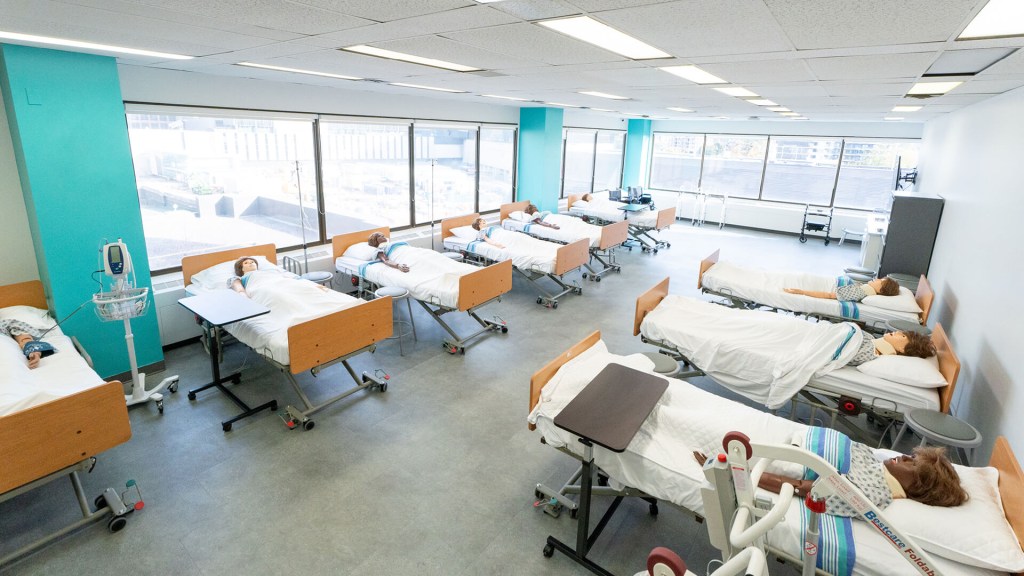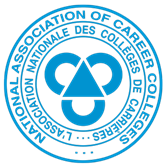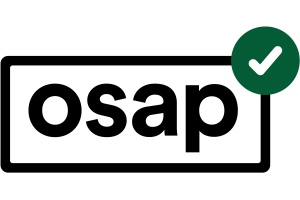NACC Personal Support Worker
Help meet the growing need for personal support workers (PSWs) through a hybrid curriculum recognized by employers across Ontario as the leading standard in PSW education.

Credential
Certificate
Program Length
28–34 weeks
Location
Toronto
Delivery method
Hybrid (online/in-person)
Program load
Full-time
Start dates
January, April, July, October
Five Steps to PSW Success at OIHI
1
EXPERT GUIDANCE
Learn from healthcare professionals with years of experience in the classroom and in the field.
2
ON-CAMPUS PSW LAB
Practise in facilities that emulate the many workplaces of PSWs, like retirement homes, community organizations and long-term care homes.
3
CLINICAL PLACEMENTS
Through clinical placements with trusted OIHI partners, gain hands-on experience and see the real impact that PSWs have on people’s lives.
4
CAREER SUPPORT
Get help landing a fulfilling job with the guidance of Career Services, who offer support with job searches, resumes, interviews and more.
5
START WORK FASTER
While many PSW programs take up to 43 weeks, this program can be completed in as little as 28 instructional weeks.
Why Start Now?
191,000
new job openings are expected in Canada by 2031 (jobbank.gc.ca).
$25,400
in incentives are offered by Ontario to each qualifying student and newly graduated personal support workers (Ontario.ca).
50,000
personal support workers are needed in Ontario alone by 2032 (Toronto Star).
How It Works

400 hours
of practical labs and theory studied online for the first 18 weeks of class.

200 hours
of practicum in a long-term care facility.

100 hours
of practicum in a community setting.
After Finishing This Program:
- Become eligible to receive financial incentives from the province of Ontario.*
- Become an employee who’s in demand across Canada.
- Feel a sense of satisfaction and purpose when you positively impact lives.
*T&C apply
OIHI’s PSW Lab
At our 124 Eglinton Avenue West campus, step into a fully equipped PSW lab designed to simulate real-life care facilities.
Under the guidance of experienced instructors, you’ll learn using real equipment, preparing you for your clinical placements and your career. This includes:

Medical mannequins to simulate real patients

Adjustable training beds to practise positioning, transferring and making beds

Walkers, canes and wheelchairs to practice mobility support
The NACC Advantage
NACC’s PSW curriculum brings a quality-assured learning experience.
- 90,000 students since 1998.
- Developed by a committee of industry experts, consultants and program-design specialists.
- Undergoes regular reviews and audits.
- Ensures that all teachers have relevant work experience in a Canadian clinical environment and meet the rigorous qualification outlined in the Ontario Career Colleges Act, 2005.
Sources: NACC Program Enhancement, NACC PSW


Job Offers before Graduation?
The NACC approach to high-quality learning has helped create a positive reputation across Canada for NACC personal support worker graduates.
When employers see an NACC certificate, they know that a graduate has the knowledge, skills and clinical experience to succeed in any PSW role.
In fact, NACC is so well-regarded that students studying their programs often receive employment offers even before they graduate.
Source: nacc.ca

Career Outcomes
Upon graduation, you will be ready to take on positions at:
- Long-term care facilities
- Home care services
- Supportive housing
- Group homes
- Hospitals
- Adult day programs
- Educational facilities
Financial Support
OSAP: students enrolled in this program may be eligible, if qualified, for loans, grants or awards granted under the Ontario Student Assistance Program (OSAP).
Placement stipend: up to $5,400 is available from the province of Ontario while you complete your clinical placement (Ontario.ca). (Subject to provincial eligibility.)
Commitment incentives: after graduation, if you commit to working in a long-term care home or with a home and community care provider for 12 months, you can receive $10,000, and another $10,000 if the home or provider is in a rural, remote or northern location (Ontario.ca). (Subject to provincial eligibility.)

Admission and Tuition
Admission Requirements
Academic requirements:
To be eligible for this personal support worker program, you must:
- Have an Ontario Secondary School Diploma or equivalent; or be at least 19 years of age or older and achieve a minimum score of 11 on Wonderlic SLE.
- Equivalent: foreign credentials must be translated in English and assessed for Grade 12 equivalency by a recognized organization such as WES (World Education Service).
*For information on admission requirements, practicum and placement components, please reach out to admissions@oihi.ca.
English Language Requirements
If English is not a student’s first language, they must provide proof of English competency.
This must be demonstrated through one of the following options:
- IELTS – International English Language Testing Services – Minimum average score of 5.5 with no band test score lower than 5.5
- Equivalent Recognized Official Proficiency Test (see Admissions Requirements page for more information)
- NACC Written Entrance Exam (passing score of 60)
- Evidence of successful completion of 2 consecutive years of full-time equivalent post-secondary study in English at a Canadian institution.
- Evidence of successful completion of 2 consecutive years of full-time equivalent post-secondary study in English at an institution in an English-speaking country
Non-academic requirements:
In addition to the academic requirements, you are also required to:
- Obtain and submit a current clear Canada-wide Police Clearance of Criminal Record with Vulnerable Sector screening, within 45 days of commencement of study. Note: If long-term care facility placement does not begin until after six (6) months following provision of the original clearance, the student may be required to have clearance completed again to satisfy placement requirements.
- Submit a complete Medical Report, within 45 days of commencement of study.
- Successfully complete a recognized course in CPR (HCP – Healthcare Provider Level).
- Successfully complete a recognized course in Standard First Aid.
- Clear COVID-19 test within one week of commencing practicum and/or other expectations in accordance with Public Health requirements.
- Successfully complete a WHMIS (Workplace Hazardous Materials Information System) certificate.
- Successfully complete a AODA (Accessibility for Ontarians with Disabilities Act) certificate.
Tuition and Fees
| Fees Descriptions* | Amount (CAD) |
| Total Tuition | $8,130 |
*Note that the fees shown on this page are (1) in Canadian dollars, (2), subject to change and (3) for Canadian permanent residents and citizens. International students may incur additional student fees and the international student tuition fee may vary. Program-specific costs are not included in the tuition fees listed.
FAQs
Is there any funding available for this program?
Students enrolled in this program may be eligible, if qualified, for loans, grants, or awards granted under the Ontario Student Assistance Program (OSAP).
Students can also access up to $5,400 from the province of Ontario while they complete their clinical placement (Ontario.ca).
What is the career outlook for personal support workers?
191,000 new job openings are expected in Canada by 2031 (jobbank.gc.ca).
50,000 personal support workers are needed in Ontario alone by 2032 (Toronto Star).
How long does it take to complete the program?
The program is 28 to 34 weeks long.
Is personal support worker a good career?
Personal support worker is a fulfilling career that let’s you make a major difference in people’s lives. It also affords flexibility, allowing you to work in an environment that suites your interests.
How do I become a personal support worker in Ontario?
You can get your personal support worker certificate from a publicly assisted college, a career college or Indigenous institute. In all instances, you will have to complete a clinical placement.
Once you have graduated, you may find work opportunities using the below resources:
- AdvantAge Ontario
- The Ontario Long Term Care Association (OLTCA)
- Ontario Personal Support Workers Association
- Ontario Health atHome
- Employment Options
Source: Government of Ontario
Curriculum
Term 1:
PSW Foundations – PSW200 – 55 Hours
In the introductory module, you will gain an overview of a PSW’s responsibilities in various settings. You will learn about client-centered versus client-directed care and the importance of emphasizing the individuality of the client and their relationships with family, friends and others. Key topics include work relationships, interpersonal skills, communications, conflict resolution, applicable legislation and stress and time management.
Safety and Mobility – PSW201 – 40 Hours
The second module covers safety for both the client and you. One of your fundamental tasks as a PSW is assisting the client with routine activities of living. You will learn about the risks of unsafe equipment or settings and the appropriate actions to take when unsafe situations are identified. Topics include infection control methods, body mechanics and transferring and lifting techniques using equipment to increase safety and reduce client anxiety.
Body Systems – PSW202 – 40 Hours
This module will introduce you to the basics of anatomy and physiology. You will gain an understanding of human body systems to apply this knowledge in your daily work as a personal support worker. These body systems include the musculoskeletal, digestive, urinary, integumentary, reproductive, cardiovascular, respiratory, nervous and endocrine systems. You will also cover common disorders and age-related changes for each body system.
Assisting with Personal Hygiene – PSW203 – 30 Hours
As a PSW, you will assist clients with all activities of daily living. Accordingly, in this course, learn how to care for clients who are ill, disabled, injured and/or confused. You will consider frailness, dignity and levels of dependence. You will also learn how to support with personal hygiene tasks, such as oral care, perineal care, bathing, grooming, dressing, bed-making, shaving, hair care and skin care. This will involve considerations for personal safety, self-esteem and dignity.
Abuse and Neglect – PSW204 – 15 Hours
This module introduces you to the concepts of violence and abuse, including its possible signs and the appropriate actions and legal requirements if abuse is suspected. You will examine personal beliefs and attitudes about family violence and abuse, as well as the concepts of client abuse and worker abuse. You will learn to recognize both indicators and causes and understand the requirements of legislation, employer policy and provisions of the service contract or support plan.
Household Management, Nutrition and Hydration – PSW205 – 25 Hours
Learn how to assist clients with their nutritional needs, household activities and household management according to client preferences, comfort and safety within employer guidelines. You will understand how to plan balanced menus, prepare shopping lists, handle food safely and implement techniques for storage and cooking. You will also address the special dietary needs of certain clients and their cultural and religious preferences.
Care Planning / Restorative Care / Documentation / Working in the Community – PSW206 – 30 Hours
In this module, understand the significance of care plans and service contracts for helping clients relearn or regain routine abilities. You will also be introduced to working in the community healthcare environment, providing support to patients and families in communities, in accordance with employer guidelines.
Term 2:
Assisting the Family, Growth and Development – PSW207 – 25 Hours
Learn to understand family characteristics in terms of structure, functions, roles, lifestyles and relationships. You will explore the influence of cultural values, practices, religious beliefs, as well as the effects of illness, stress and disability on family relationships, which are central to your ability as a PSW to provide effective support. This module also explores the stages of growth and development throughout the life cycle and your role in providing respite to families.
Assisting the Dying Person – PSW208 – 30 Hours
In this module, you will learn about hospice, palliative and end-of-life care and the integration of a palliative approach to care. You will explore ways of being, communication and practical strategies to provide psychosocial support and physical comfort care for both the person and their family. This module addresses provincial palliative care competencies, including competencies for caring for First Nation, Inuit, Metis, and urban Indigenous peoples.
Assisting with Medications – PSW209 – 20 Hours
Within the PSW scope of practice, you will learn about medication administration versus assistance. You will gain basic knowledge of the drugs used in the treatment of common diseases and disorders including their use, classification, effects and routes of administration. You will identify the purposes, required instruction and cautions. You will also understand the importance of observation for both desired and undesired outcomes, as well as the procedures to follow if there is a concern or problem with medications.
Cognitive/Mental Health Issues and Brain Injuries – PSW210 – 40 Hours
This module introduces you to common psychiatric conditions such as affective disorders, schizophrenia, substance abuse, cognitive impairment and brain injury. You will learn about the possibility of multiple conditions such as Alzheimer’s disease and depression and the role of the family caregiver. You will also learn the importance of observation, documentation and reporting in order to recognize changes in behavior that can be related to psychiatric conditions or an increased risk of suicide.
Health Conditions – PSW211 – 40 Hours
You will be introduced to ongoing conditions and basic concepts of assistance, as well as the general effects on a person of common disabilities, conditions and diseases. You will gain skill in the necessary techniques while focusing on the importance of providing support safely, effectively and comfortably. Concepts of maintenance, rehabilitation and restoration will be discussed, as will the importance of the support team in providing assistance and training for these additional skills.
Gentle Persuasive Approaches in Dementia Care – PSW212 – 10 Hours
Gentle Persuasive Approaches (GPA) is a multi-disciplinary program designed for everyone who interacts with older adults in the workplace. As a participant, you will be guided to fully understand responsive behaviors in order to respond effectively and appropriately in a workplace setting.
Clinical Placement (Facility) – PSW900 – 200 Hours
Clinical placements provide you with an opportunity to practise your new skills in a work setting. You will gain experience in a wider range of PSW skills, become more self-confident and may receive offers of employment from the placement site. In this module, you will work in a facility setting for 100 hours under the supervision of your instructor and a preceptor provided by the host site. Your instructor will be available by phone and email during the placement.
Clinical Placement (Community) – PSW901 – 100 Hours
Clinical placements will also provide you with an opportunity to practise your new skills in a community setting. While on placement, you will gain experience with a wider range of PSW skills, become more self-confident and may receive offers of employment from the placement site. In this module, you will work under the supervision of a preceptor provided by the host site. Your instructor will be available by phone and email.
Ready to Get Started?
Simply fill out the below form, click submit and we’ll connect with you for a free, zero-pressure consultation.
You might also be interested in
-

Early Childhood Assistant
Learn to support children’s social, emotional and physical development through a hybrid diploma program that ends with a valuable practicum at a childcare facility. With hybrid learning, study theory online while gaining practical experience in a fully equipped early childhood lab.